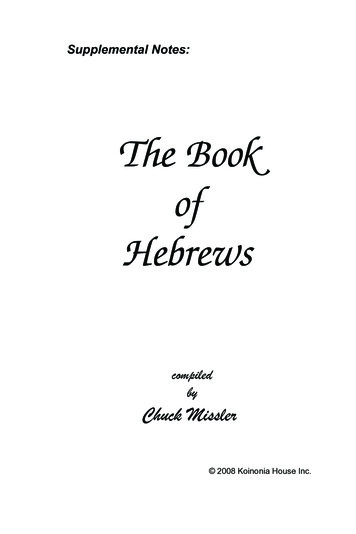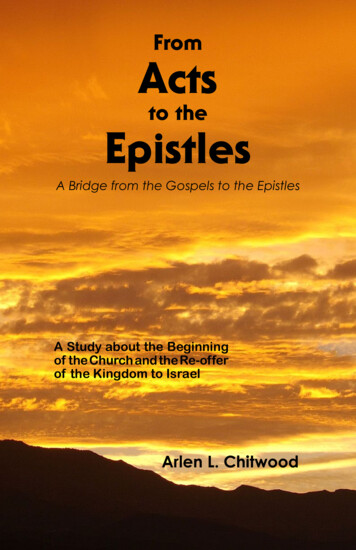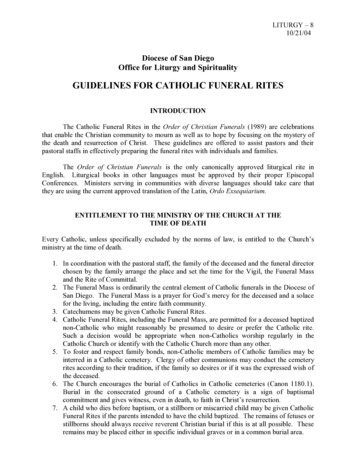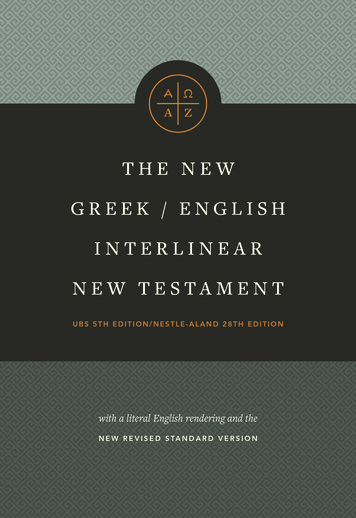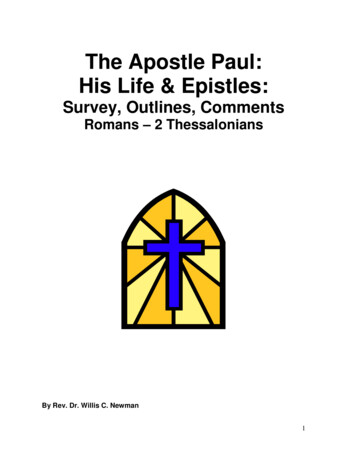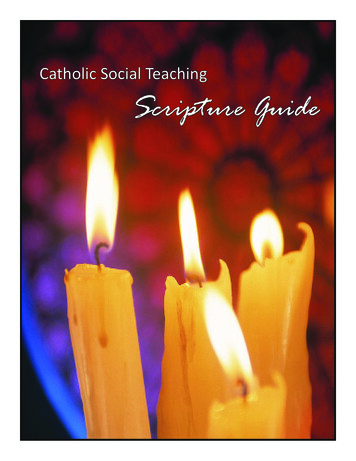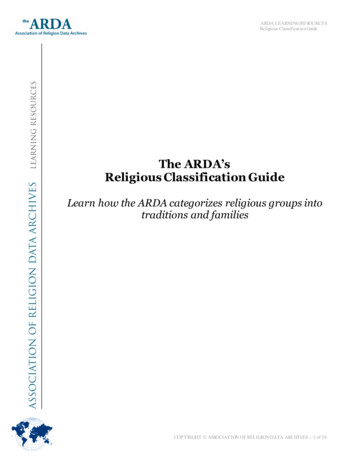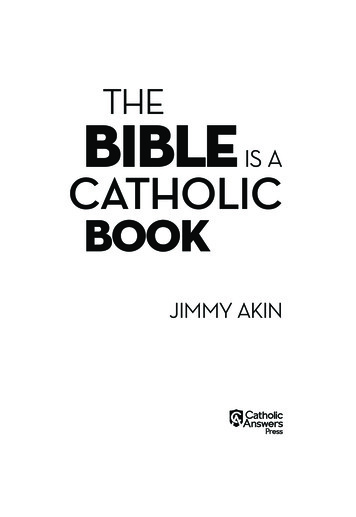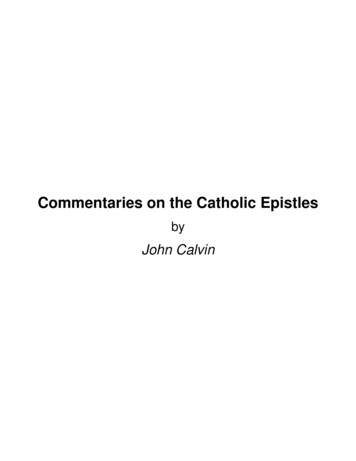
Transcription
Commentaries on the Catholic EpistlesbyJohn Calvin
About Commentaries on the Catholic Epistles by John Date Created:Editorial Comments:Contributor(s):LC Call no:LC Subjects:Commentaries on the Catholic tmlCalvin, John (1509-1564)(Alternative)(Translator)Grand Rapids, MI: Christian Classics Ethereal LibraryPublic Domain1999-11-231.0 initial scanning created much American spelling. sg initial XMLinsertion, footnote reconciliation. 1.01 fj — ThML for OLB and ForeignLanguage XML inserted 1.02 fj — proofed without a source textAges (Transcriber)sg, fj (Markup)BS491The BibleWorks about the Bible
Commentaries on the Catholic EpistlesJohn CalvinTable of ContentsAbout This Book. . . . . . . . . . . . . . . . . . .Commentary on James, Peter, 1 John, Jude.Translator's Preface. . . . . . . . . . . . . . . . .Calvin's Dedication. . . . . . . . . . . . . . . . .Commentary on First Peter. . . . . . . . . . . .The Argument. . . . . . . . . . . . . . . . . . .Chapter 1. . . . . . . . . . . . . . . . . . . . . .1 Peter 1:1-2. . . . . . . . . . . . . . . . . . .1 Peter 1:3-5. . . . . . . . . . . . . . . . . . .1 Peter 1:6-9. . . . . . . . . . . . . . . . . . .1 Peter 1:10-12. . . . . . . . . . . . . . . . . .1 Peter 1:13-16. . . . . . . . . . . . . . . . . .1 Peter 1:17-22. . . . . . . . . . . . . . . . . .1 Peter 1:23-25. . . . . . . . . . . . . . . . . .Chapter 2. . . . . . . . . . . . . . . . . . . . . .1 Peter 2:1-5. . . . . . . . . . . . . . . . . . .1 Peter 2:6-8. . . . . . . . . . . . . . . . . . .1 Peter 2:9-10. . . . . . . . . . . . . . . . . .1 Peter 2:11-12. . . . . . . . . . . . . . . . . .1 Peter 2:13-16. . . . . . . . . . . . . . . . . .1 Peter 2:17. . . . . . . . . . . . . . . . . . . .1 Peter 2:18-20. . . . . . . . . . . . . . . . . .1 Peter 2:21-23. . . . . . . . . . . . . . . . . .1 Peter 2:24-25. . . . . . . . . . . . . . . . . .Chapter 3. . . . . . . . . . . . . . . . . . . . . .1 Peter 3:1-4. . . . . . . . . . . . . . . . . . .1 Peter 3:5-6. . . . . . . . . . . . . . . . . . .1 Peter 3:5-6. . . . . . . . . . . . . . . . . . .1 Peter 3:8-9. . . . . . . . . . . . . . . . . . .1 Peter 3:10-15. . . . . . . . . . . . . . . . . .1 Peter 3:15-16. . . . . . . . . . . . . . . . . .1 Peter 3:17-18. . . . . . . . . . . . . . . . . .1 Peter 3:19-22. . . . . . . . . . . . . . . . . .Chapter 4. . . . . . . . . . . . . . . . . . . . . .1 Peter 4:1-5. . . . . . . . . . . . . . . . . . .iii.p. iip. 1p. 2p. 5p. 11p. 11p. 12p. 12p. 14p. 17p. 20p. 24p. 27p. 32p. 35p. 35p. 39p. 43p. 45p. 47p. 50p. 51p. 52p. 55p. 56p. 57p. 58p. 59p. 61p. 62p. 65p. 67p. 68p. 72p. 72
Commentaries on the Catholic Epistles1 Peter 4:6-11. . . . . . .1 Peter 4:12-17. . . . . . .1 Peter 4:17-19. . . . . . .Chapter 5. . . . . . . . . . .1 Peter 5:1-4. . . . . . . .1 Peter 5:5-7. . . . . . . .1 Peter 5:8-11. . . . . . .1 Peter 5:12-14. . . . . . .Commentary on First John.The Argument. . . . . . . .Chapter 1. . . . . . . . . . .1 John 1:1-2. . . . . . . . .1 John 1:3-7. . . . . . . . .1 John 1:8-10. . . . . . . .Chapter 2. . . . . . . . . . .1 John 2:1-2. . . . . . . . .1 John 2: 3-6. . . . . . . .1 John 2: 7-11. . . . . . .1 John 2:12-14. . . . . . .1 John 2:15-17. . . . . . .1 John 2:18-19. . . . . . .1 John 2:20-23. . . . . . .1 John 2:24-29. . . . . . .Chapter 3. . . . . . . . . . .1 John 3:1-3. . . . . . . . .1 John 3:4-6. . . . . . . . .1 John 3:7-10. . . . . . . .1 John 3:10-13. . . . . . .1 John 3:15-18. . . . . . .1 John 3:19-22. . . . . . .1 John 3:23-24. . . . . . .Chapter 4. . . . . . . . . . .1 John 4:1-3. . . . . . . . .1 John 4:4-6. . . . . . . . .1 John 4:7-10. . . . . . . .1 John 4:11-16. . . . . . .1 John 4:17-18. . . . . . .1 John 4:19-21. . . . . . .Chapter 5. . . . . . . . . . .1 John 5:1-5. . . . . . . . .John Calvin.iv.p. 76p. 80p. 84p. 86p. 86p. 89p. 91p. 94p. 96p. 96p. 96p. 96p. 99p. 102p. 104p. 104p. 106p. 108p. 111p. 114p. 116p. 118p. 121p. 124p. 124p. 128p. 130p. 133p. 134p. 137p. 139p. 140p. 140p. 144p. 146p. 149p. 151p. 153p. 154p. 154
Commentaries on the Catholic Epistles1 John 5:6-9. . . . . . .1 John 5:9-12. . . . . .1 John 5:13-15. . . . .1 John 5:16-18. . . . .1 John 5:19-21. . . . .Commentary on James.The Argument. . . . . .Chapter 1. . . . . . . . .James 1:1-4. . . . . . .James 1:5-8. . . . . . .James 1:9-11. . . . . .James 1:12-15. . . . .James 1:16-18. . . . .James 1:19-21. . . . .James 1:22-27. . . . .Chapter 2. . . . . . . . .James 2:1-4. . . . . . .James 2:5-7. . . . . . .James 2:8-11. . . . . .James 2:12-13. . . . .James 2:14-17. . . . .James 2:18-19. . . . .James 2:20-26. . . . .Chapter 3. . . . . . . . .James 3:1-5. . . . . . .James 3:5-6. . . . . . .James 3:7-12. . . . . .James 3:13-18. . . . .Chapter 4. . . . . . . . .James 4:1-3. . . . . . .James 4:4-6. . . . . . .James 4:7-10. . . . . .James 4:11-12. . . . .James 4:13-17. . . . .Chapter 5. . . . . . . . .James 5:1-6. . . . . . .James 5:7-9. . . . . . .James 5:10-11. . . . .James 5:12-13. . . . .James 5:14-15. . . . .John Calvin.v.p. 158p. 161p. 163p. 165p. 168p. 171p. 171p. 171p. 171p. 174p. 176p. 177p. 180p. 182p. 183p. 186p. 186p. 188p. 189p. 191p. 192p. 194p. 195p. 198p. 198p. 200p. 201p. 202p. 205p. 205p. 207p. 208p. 210p. 212p. 214p. 214p. 217p. 219p. 220p. 222
Commentaries on the Catholic EpistlesJames 5:16-18. . . . . . . . .James 5:19-20. . . . . . . . .Commentary on Second Peter.The Argument. . . . . . . . . .Chapter 1. . . . . . . . . . . . .2 Peter 1:1-4. . . . . . . . . .2 Peter 1:5-9. . . . . . . . . .2 Peter 1:10-15. . . . . . . . .2 Peter 1:16-18. . . . . . . . .2 Peter 1:19-21. . . . . . . . .Chapter 2. . . . . . . . . . . . .2 Peter 2:1-3. . . . . . . . . .2 Peter 2:4-8. . . . . . . . . .2 Peter 2:9-11. . . . . . . . .2 Peter 2:12-16. . . . . . . . .2 Peter 2:17-19. . . . . . . . .2 Peter 2:20-22. . . . . . . . .Chapter 3. . . . . . . . . . . . .2 Peter 3:1-4. . . . . . . . . .2 Peter 3:5-8. . . . . . . . . .2 Peter 1:9-13. . . . . . . . .2 Peter 3:14-18. . . . . . . . .Commentary on Jude. . . . . . .The Argument. . . . . . . . . .Chapter 1. . . . . . . . . . . . .Jude 1-2. . . . . . . . . . . . .Jude 3-4. . . . . . . . . . . . .Jude 5-7. . . . . . . . . . . . .Jude 8-10. . . . . . . . . . . .Jude 11-13. . . . . . . . . . .Jude 14-16. . . . . . . . . . .Jude 17-19. . . . . . . . . . .Jude 20-25. . . . . . . . . . .Scripture Translations. . . . . .First Peter. . . . . . . . . . . . .Chapter 1. . . . . . . . . . . .Chapter 2. . . . . . . . . . . .Chapter 3. . . . . . . . . . . .Chapter 4. . . . . . . . . . . .Chapter 5. . . . . . . . . . . .John Calvin.vi.p. 224p. 226p. 228p. 228p. 229p. 229p. 233p. 235p. 239p. 241p. 245p. 245p. 247p. 250p. 252p. 255p. 257p. 258p. 258p. 261p. 263p. 265p. 269p. 269p. 269p. 269p. 271p. 273p. 275p. 277p. 278p. 280p. 281p. 284p. 284p. 284p. 285p. 286p. 287p. 288
Commentaries on the Catholic EpistlesFirst John. . . . . . . . . . . . . . .Chapter 1. . . . . . . . . . . . . .Chapter 2. . . . . . . . . . . . . .Chapter 3. . . . . . . . . . . . . .Chapter 4. . . . . . . . . . . . . .Chapter 5. . . . . . . . . . . . . .James. . . . . . . . . . . . . . . . . .Chapter 1. . . . . . . . . . . . . .Chapter 2. . . . . . . . . . . . . .Chapter 3. . . . . . . . . . . . . .Chapter 4. . . . . . . . . . . . . .Chapter 5. . . . . . . . . . . . . .Second Peter. . . . . . . . . . . . .Chapter 1. . . . . . . . . . . . . .Chapter 2. . . . . . . . . . . . . .Chapter 3. . . . . . . . . . . . . .Jude. . . . . . . . . . . . . . . . . . .Chapter 1. . . . . . . . . . . . . .Indexes. . . . . . . . . . . . . . . . . .Index of Scripture References. .Index of Scripture Commentary.Greek Words and Phrases. . . .Hebrew Words and Phrases. . .Latin Words and Phrases. . . . .John Calvin.vii.p. 288p. 288p. 289p. 290p. 291p. 292p. 293p. 293p. 294p. 295p. 296p. 297p. 298p. 298p. 299p. 300p. 301p. 301p. 303p. 303p. 305p. 306p. 311p. 311
Commentaries on the Catholic EpistlesJohn Calvinviii
Comm on Catholic EpistlesJohn CalvinCOMMENTARIESONTHE CATHOLIC EPISTLESBY JOHN CALVINTRANSLATED AND EDITEDBY THE REV. JOHN OWEN,VICAR OF THRUSSINGTON, AND RURAL DEAN, LEICESTERSHIRECHRISTIAN CLASSICS ETHEREAL LIBRARYGRAND RAPIDS, MIhttp://www.ccel.org
Comm on Catholic EpistlesJohn CalvinTRANSLATOR’S PREFACETHE Dedication to King Edward the Sixth is remarkably interesting, as it refers to the characterof Popery at that day, and to its manoeuvres with regard to a General Council. The language isstrong, and perhaps rougher than what would be at present used, but still true according to all wegather from history as to the state of things in those days. The main principles of Popery are stillthe same, and similar are its proceedings, though they may be more disguised, and its spirit isequally intolerant and persecuting. Like Mahomedanism, it is exclusive, and ever injurious to theharmony and peace of society.The order in which the Epistles are arranged is not the same as in our version. There has notbeen a uniformity in this respect among the ancients. The reason for the arrangement here adoptedwas probably this, that the First Epistle of Peter, and the First of John, had, from the beginning,been universally acknowledged as genuine, while the Epistle of James, the Second of Peter, andthat of Jude, had not from the first been universally received as canonical, though they wereeventually so received. The Second and the Third Epistle of John were evidently not deemed byCalvin as “catholic;” and for this reason, as it seems, he omitted them.The word “Catholic,” or General, as applied to the Epistles here explained, has been differentlyunderstood. Some have thought that they have been thus called, because they contain catholic truths;but other Epistles might, for this reason, be also called catholic. Others have supposed that catholicis synonymous with canonical; but in this case also there is no more reason for applying the wordto these Epistles than to any other Epistles. But the more probable opinion is, that they were calledCatholic, or General, because they were not written to any particular Church, but to Jewish or toGentile Christians generally. Moreover, the term was not given them at first, but in subsequentages.The most probable dates of the five Epistles here explained are the following: —BOOKDATEThe Epistle of James,A.D. 61The First Epistle of Peter,A.D. 65The Second Epistle of Peter,A.D. 65The Epistle of Jude,A.D. 66The First, Epistle of JohnA.D. 68This is the order according to the dates most approved by the learned. There is, for the mostpart, a unanimity as to the dates of the three first Epistles; but with regard to the Epistle of Jude,and the First Epistle of John, there is not the same agreement. There are many who fix later dates:to Jude, 90, and to John, 91 or 92. But this is a matter of no great consequence.No doubt can be justly entertained but that James, called the Less, was the author of the Epistle.He was the son of Alphaeus or Cleopas, and of Mary, probably a cousin, not a sister, of Mary themother of our Lord. Hence he is called our Lord’s brother, (Galatians 1:19;) that is, a near relative,as the Word brother is often taken in Scripture. He took a leading part in the council held atJerusalem, mentioned in Acts 15; and, according to Jerome, he resided there thirty years, and2
Comm on Catholic EpistlesJohn Calvinpresided over the Church. He was put to death, as Hegesippus relates, who flourished in the secondcentury, by a tumultuous mob, excited by Jewish zealots, in the year 62.The canonicity of James’s Epistle has been a subject of dispute, though almost universallyallowed in the present day. The facts respecting it, according to Basnage, are these, — During thethree first centuries it was not extensively known; in the fourth century its authenticity was by somedisputed; but in the fifth century it was universally acknowledged as genuine; and it has ever sincebeen so acknowledged, with a very few exceptions. What seems to be a sufficient evidence in itsfavor is the fact, that it is found as a part of Holy Scripture in the first Syriac Version, which wasmade early in the second century.The occasion of writing the Epistle appears to have been the abuse made of the doctrine of freegrace by professing Christians, — a subject referred to also by Paul in Romans vi., and in his otherEpistles. Abounding grace is at one time despised and rejected; at another time it is turned intolicentiousness: these are evils which have ever prevailed in the Church. The Pharisee is too proudto receive grace; the Antinomian pretends to receive and magnify grace, that he may gratify theinclinations of his sinful nature. It was against the Antinomian that James wrote his Epistle.According to Lardner and Macknight, the Epistle was addressed to the whole Jewish nation,at home and abroad, believers and unbelievers; according to Grotius and Wall, to the Jews dispersedabroad indiscriminately, believing and unbelieving; according to Michaelis, to the believing Jews,while the unbelieving were not overlooked; but according to Beza and Scott, to the scattered Jewswho professed the Christian faith. And this last opinion has the strongest reasons and evidence inits favor. 1With regard to the First Epistle of Peter, there has never been a doubt respecting its genuineness.This Apostle took a prominent part at first in the cause of Christianity, but of his labors after thecouncil at Jerusalem, in the year 49, recorded in Acts 15, we have no account in Scripture. Mentionis indeed made, in Galatians 2:11, of his being afterwards at Antioch. It has been justly concludedfrom the superscription of this Epistle that he exercised his ministry in those parts which are herementioned.It was thought by Beza and Grotius that the Epistle was addressed to converted Jews; but byDoddridge, Macknight, and Scott, to Christians in general, both Jews and Gentiles. The latter opinionis the most probable. The arguments assigned by Horne, in his Introduction, in favor of the formeropinion, are by no means satisfactory.With regard to the Second Epistle of Peter, doubts have been entertained by some as to itsauthenticity. It appears that it was not at first so widely known as his First Epistle; and this wasprobably the reason why there were some during the first three centuries who did not regard it asgenuine. But it has been quoted as a part of Scripture by some of the earliest Fathers, and fullyacknowledged as authentic by those of the fourth and succeeding centuries.The First Epistle of John has from the beginning been uniformly received as a portion of DivineRevelation. Some difference has existed as to the persons for whom it was especially intended, —a matter of no great importance. Some have supposed it to have been written for the Jewish Christiansin Judea; but others, with more probability, for Christians generally, both Jewish and Gentile.Though there is no name attached to it, yet there has been universal consent from the beginningthat John was its author; and indeed the style of it throughout is sufficient to shew that he was the1See Horne’s Introduction, vol. 4, part 2, chap. 4, sect. 3.3
Comm on Catholic EpistlesJohn Calvinwriter of it; for his Gospel and the Book of Revelation are in this respect exactly alike; and it is astyle peculiarly his own.Jude, or Judas, was, as he says, the brother of James, and therefore the son of Alphaeus orCleopas. Though he does not call himself an apostle, yet he proved himself to be so by saying thathe was the brother of James. He is called, as James was, the brother of our Lord, Matthew 13:55.We have in Scripture no account of his ministry after the day of Pentecost.His Epistle was not at first universally received as canonical. This is acknowledged by Origen,Eusebius, and Jerome; at the same time, they themselves so regarded it; and Jerome says that inhis day it was by most received as genuine; and it has been quoted as a part of Scripture by Clementof Alexandria, Tertullian, Cyril of Jerusalem, Athanasius, Ambrose, and Augustine. 2That some of the Epistles were not universally received as authentic at first is no matter ofwonder, when we consider the scattered condition of the Church, and the scanty means ofcommunication. The fact, that some had doubts respecting them does not in the least degree invalidatetheir genuineness; on the contrary, it has conduced to strengthen the evidence in their favor; forthe doubts of some must have occasioned a more minute inquiry as to their authenticity. And it wasnot long before all the Epistles, about which there had been some doubts, had attained the universalapprobation of the Church; and what Lardner states is worthy of special attention, — That nowritings, received by the primitive Church as genuine, have been since proved to be spurious; andthat no writings, regarded by it as spurious, have been since proved to be genuine.The Editor must mention here, what perhaps he ought to have mentioned before, — that in histranslations he has not always retained what is called the historical present tense, which is oftenused by Calvin, according to the practice of Latin and Greek writers, and also of the Prophets andthe Evangelists. This mode of writing does not accord with the usage of the present day.Our translators have not been uniform in this respect either in the New or the Old Testament;for they sometimes departed from the original as to this tense, though, for the most part, they retainedit. As, for instance, in John 11:39-40, the historical present is not retained in the 39th, while it isretained in the 40th verse. The anomalies as to the tenses often met with, especially in the Psalms,have arisen from overlooking this peculiarity. The future in Hebrew is very often used for thepresent; and this is the historical present, and ought to be rendered in our language in the past tense.J.O.ThrussIngton, Sept. 29, 1855.2See Wolfius’ Prolegomena to this Epistle.4
Comm on Catholic EpistlesJohn CalvinDEDICATIONTO HIS MOST SERENE HIGHNESS,EDWARD THE SIXTHTHE KING OF ENGLAND, THE LORD OF IRELAND, AND A MOST CHRISTIANPRINCE,JOHN CALVIN.Behold, I return to you again, most excellent King. For though I did not expect that theCommentaries on Isaiah, which I lately dedicated to your Majesty, were a worthy gift, yet it wasoffered with my hearty good wishes. I have, therefore, thought of adding the Catholic Epistles, asthey are commonly called, as a supplement to make up a full measure, so that both might come toyour hands at the same time. And doubtless, since they were written either to Gentiles far distant,or to such as inhabited various countries far asunder, it is nothing new to them to pass over the sea,and to make a long circuit in coming to your Majesty. At the same time I thus as a private individualoffer to you, most illustrious King, my labors, that being published under your name, they mayprofit all.And truly, if there has ever been a time when the truth of God ought to have been freely andboldly maintained, it has never been more necessary than in the present day, as all must see. Notto mention the atrocious cruelty exercised towards its professors, to omit also all those machinationsby which Satan fights against it, sometimes covertly and sometimes openly, there are places inwhich the pure doctrine of Religion lately prevailed, but where now the satellites of the RomanAntichrist, by their spurious deformations so mock Christ as though they gave a reed in his handinstead of a scepter, and laid a crown of thorns on his head. When these crafty corrupters of thepurity of the Gospel hope by their arts gradually to extinguish it, with what cowardice do theyconnive at these mockeries offered to Christ, who ought to have hazarded their life a hundred timesrather than to redeem it for a very short time by their perfidious silence?In the meantime, the Pope himself, to complete the last tragedy of crucifying the Son of God,is said to have summoned again his own masked council. Though he marches with his savagesoldiery to obliterate the name of Christ and to destroy his Church, yet every kind of council is tohim as a sacred sword, to make slaughter as it were a solemn rite. Thus Paulus the Third, when hehad resolved to kill and destroy all by whom the defense of truth was preferred to their own life,made a show at Trent of that odious spectre, though disguised in fine colors, that he might put anend to the Gospel as it were by its thunders. But all that preparation, when the good fathers hadbegun, through some gleams emitted at the sessions, to dazzle the eyes of the simple, was put anend to by a secret and sudden blast from the holy seat, and vanished into smoke, except that for thepurpose of continuing the terror, a little cloud rested for a time on Bononia.Hence Julius, his successor, who had performed his part previously at Trent, is said to bepreparing himself now for this stratagem, as though this only remained as means to obliterate theGospel from the memory of men, that is, to fulminate against us with the horrible and terrific decreesof council; though many think that he only makes a pretense. But it signifies but little whether hepretends or really means to call a council. It is indeed a thing clear and well proved, that since thePapacy began to decline through the efforts of Luther, whoever occupied that citadel of tyranny,5
Comm on Catholic EpistlesJohn Calvinthough they might hope to obtain some support from a council, they yet have shunned this kind ofremedy in way similar to a sick man, who, being all over full of ulcers, dreads even the touch ofthe most tender physician. Therefore common even among children is the saying, that the Papacycannot otherwise be assisted by a council than by cauterizing or amputation.But I see no cause why the Popes dread councils so much, except that fear is an inseparablecompanion of a bad conscience. For what, I pray, was the late rabble at Trent, (to which yet theygave the name of a holy, general, and ecumenical synod,) but a sort of empty apparition, which nomore disturbed the pleasures of the Pope than the clangor of trumpets, or the sound of drums, withwhich he daily amuses himself? Were, indeed, a synod from all parts really assembled, here mightbe some cause of fear, lest a disturbance, arising in so great a multitude, should occasion a greatertumult. But by such fictitious councils as that of Trent, who can believe that a Pope could be terrifiedany more than by children’s rattles, but that on the contrary he would sweetly slumber as throughthe blandishments of a quieter sleep? For example, two or three cardinals shall be chosen by thePope, being his bosom friends, who shall wield all the authority. The same tyrant will hire fromhis courtiers some greedy fellow for a few ducats a month, who, being clothed in the mask of apatriarch, will servilely declare as his own opinion what had been dictated to him. Such was thatblind Robert at Trent, whom I saw some time ago at Ratisbon, busying himself, not less foolishlythan wickedly, in behalf of the Pope, when by his inveiglements he tried to draw me to a conferencewith Contarenus. There will fly together from all Italy the three-halfpenny bishops, of whom therewill be a vast abundance. There will come also from France and Spain some of the light-headedand fatuitous, and others infamous for the vices of their former life; who afterwards returning homewill boast that they had rendered a good and faithful service to the Catholic Church. Moreover,there will come forth from the caves of monks a great conflux of frogs into that marsh, who bytheir eager croaking will banish far away every truth. What! do I imagine here a new thing, or doI not, on the contrary, correctly describe the assembly which was lately seen at Trent?Why then is it that the Pope dreads these guardians of his own tribunal, who are all, in the firstplace, his own servile creatures; and who, in the second place, seek no other thing than to gain byany means his favor?Our Julius especially, who is a veteran in matters of this kind, can in mockery, whenever hepleases, compose such a council as this, so as, in the meantime, to leave as usual the thing undone.And, indeed, as he has given to many of the Dominicans the red cap, it seems to be no obscureprelude of such an event. This order, as they say, has ever been in favor with him; but such profusionarises from a higher cause. He, indeed, knows well, that none are more shameless than these beggarlyfellows, as he has often employed at his nod their illiberal and sordid services. When he raisedthem again to this dignity, he knew that whatever he might bid them to do, none would be moreaudacious or more cruel than they. Besides, he is not ignorant that most of these hungry dogs,feeding on the same rewards, would rush into any contentions he wishes. I do not, however, saythat they are mistaken who declare that he does not desire a council. But when he has arranged hisown theater, some sudden storm will be r
Calvin as "catholic;" and for this reason, as it seems, he omitted them. The word "Catholic," or General, as applied to the Epistles here explained, has been differently understood. Some have thought that they have been thus called, because they contain catholic truths; but other Epistles might, for this reason, be also called catholic.


